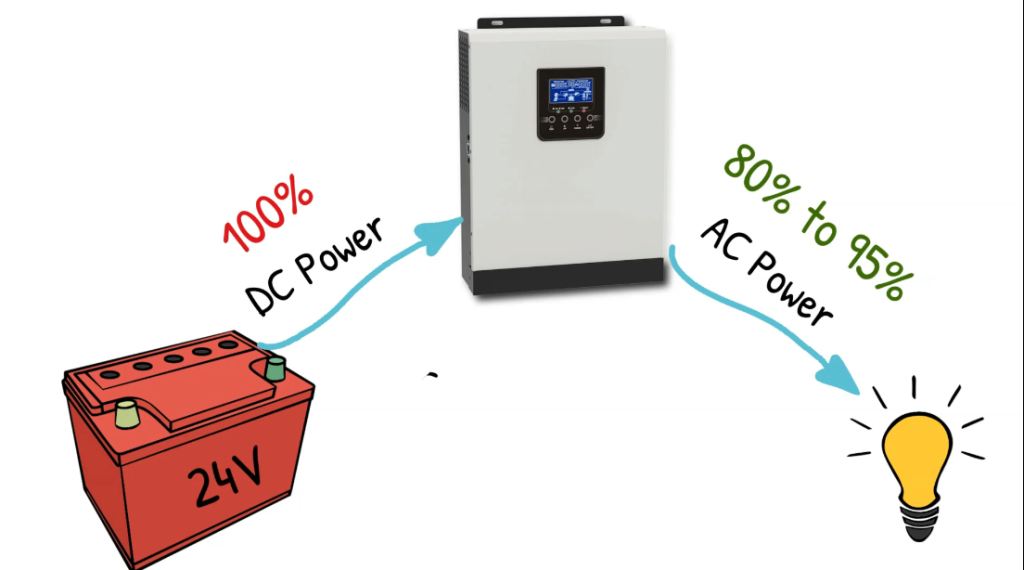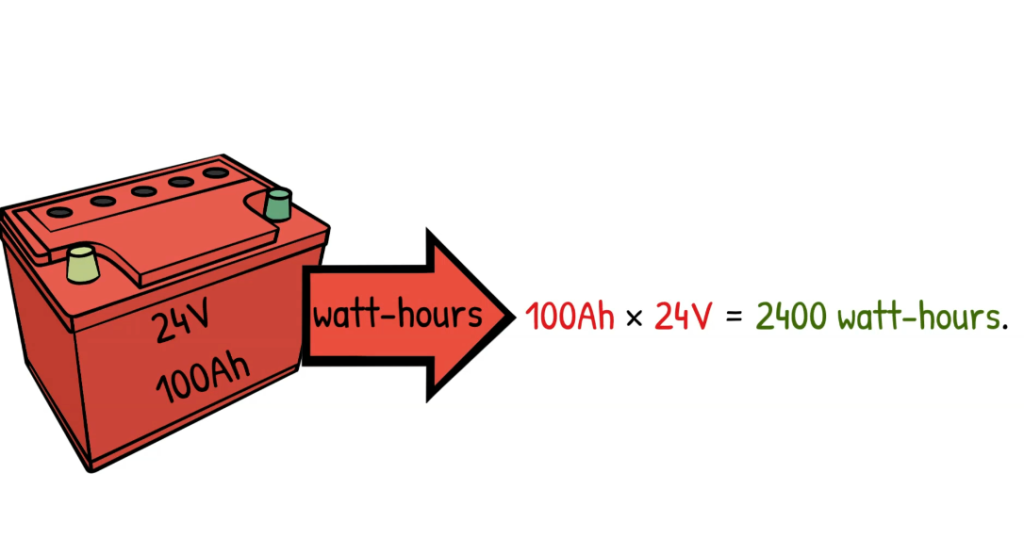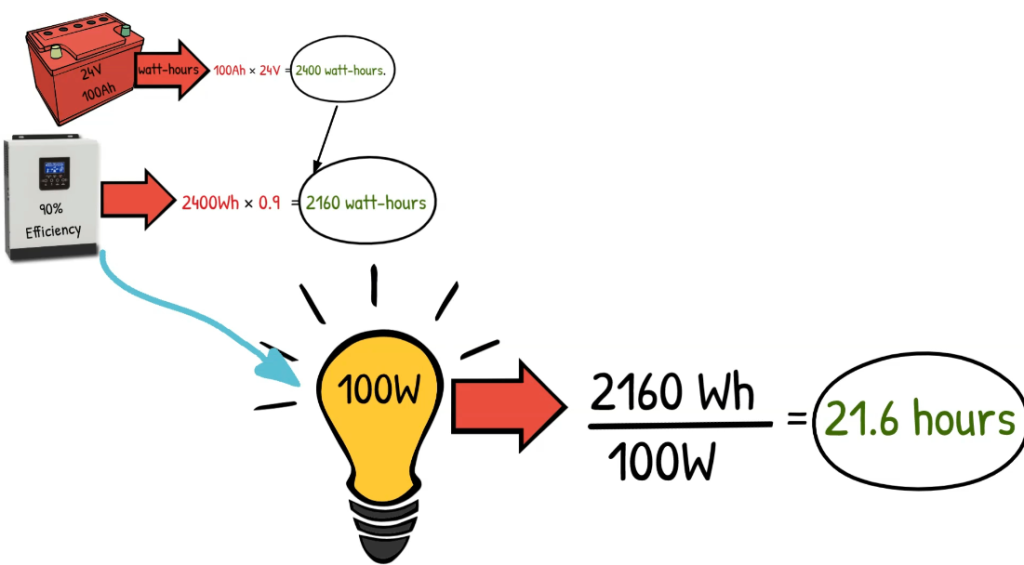If you are using an inverter for backup power, solar systems, RVs, or off-grid living, one of the most common questions is:
“How long will my 24V battery last with an inverter?”
The runtime of your inverter depends on a few important factors — battery capacity, inverter efficiency, and the power consumption of the device you are running. In this article, we’ll break down the calculation in detail, provide examples, and give you tips to maximize your battery performance.
What is an Inverter and Why Efficiency Matters?
An inverter is a device that converts DC power (Direct Current) from your battery into AC power (Alternating Current), which is the type of electricity most household appliances use.
However, no inverter is 100% efficient. Inverter efficiency typically ranges between 80% and 95%, meaning some energy is lost in the conversion process. This efficiency plays a major role in determining how long your battery will last.

Understanding Battery Capacity
Battery capacity is usually rated in Ampere-hours (Ah) and Voltage (V).
To calculate total energy stored, we convert this into Watt-hours (Wh) using the formula:
👉 Watt-hours (Wh) = Ampere-hours (Ah) × Voltage (V)
For example, a 24V 100Ah battery has:
24 × 100 = 2400 Wh (watt-hours).

But since the inverter is not fully efficient, we need to adjust this number.
Step-by-Step Calculation: 24V Battery with Inverter
Let’s assume:
-
Battery = 24V 100Ah
-
Inverter Efficiency = 90%
-
Load = 100W device
Step 1: Convert Battery Capacity into Watt-hours
100 Ah × 24 V = 2400 Wh
Step 2: Adjust for Inverter Efficiency
2400 Wh × 0.9 = 2160 Wh usable power
Step 3: Divide by Device Load
2160 Wh ÷ 100 W = 21.6 hours runtime
This means a fully charged 24V 100Ah battery can power a 100W device for about 21.6 hours (under ideal conditions).

Example Loads and Their Approximate Runtime
Here’s a quick idea of how long a 24V 100Ah battery might last with different loads:
-
LED TV (120W) → ~18 hours
-
Laptop charger (90W) → ~24 hours
-
Fan (60W) → ~36 hours
-
Mini fridge (200W) → ~10.8 hours
Note: Actual runtime may vary depending on battery health, inverter efficiency, and power fluctuations.
12V vs 24V Battery Runtime – Quick Comparison
A 12V 100Ah battery stores about 1200 Wh usable power (after efficiency adjustment).
The same 100Ah capacity at 24V stores double the energy (2160 Wh).
👉 Result: A 24V system generally lasts almost twice as long as a 12V system for the same load.
If you want the full 12V calculation, check out my detailed guide here (link to 12V article/video).
Factors That Affect Battery Runtime
Several real-world conditions can reduce your battery’s runtime:
-
Inverter self-consumption – inverters use some power themselves.
-
Device power fluctuations – appliances don’t always consume steady power.
-
Battery age and condition – older batteries have lower usable capacity.
-
Depth of discharge (DoD) – draining a battery completely shortens its life.
Tips to Maximize Battery and Inverter Performance
-
Avoid deep discharges – try not to drain below 50% if possible.
-
Recharge properly – use the right charger settings for your battery type.
-
Match inverter size – don’t use an oversized inverter for small loads.
-
Use energy-efficient devices – LED lights, inverter refrigerators, etc.
-
Keep batteries in good condition – maintain proper temperature and connections.
Conclusion
A 24V 100Ah battery with a 90% efficient inverter can power a 100W device for around 21.6 hours. But in the real world, runtime will depend on the device’s actual power draw, battery health, and inverter efficiency.
If you’re planning a backup power system or off-grid setup, always calculate based on your specific load requirements and battery size. A 24V system generally provides better efficiency and longer runtime compared to 12V systems.
👉 For a full comparison, don’t forget to check my guide on 12V battery with inverter runtime.
With the right setup, you can get reliable power backup for your home, RV, or solar system.
Frequently Asked Questions (FAQs)
1. How long will a 24V 200Ah battery last with an inverter?
A 24V 200Ah battery stores:
24V × 200Ah = 4800 Wh.
With 90% inverter efficiency → 4800 × 0.9 = 4320 Wh usable power.
If you run a 200W device:
4320 ÷ 200 = 21.6 hours of runtime.
Basically, a 200Ah battery will last about twice as long as a 100Ah battery for the same load.
2. Which is better: 12V or 24V inverter system?
Both systems work, but:
-
12V is good for small loads (lights, fans, laptops, small appliances).
-
24V is more efficient for larger setups (refrigerators, pumps, solar systems, home backup).
With higher voltage, you get less current, reduced losses, and longer runtime for the same Ah capacity.
3. How do I calculate inverter runtime for any battery?
Use this simple formula:
👉 Runtime (hours) = (Battery Ah × Battery V × Inverter Efficiency) ÷ Device Watts
Example: 100Ah × 24V × 0.9 ÷ 100W = 21.6 hours.
4. Does inverter efficiency really matter that much?
Yes ✅. An inverter with 80% efficiency wastes more power than one with 95% efficiency. Choosing a high-efficiency inverter can add 1–3 extra hours of runtime for the same battery and load.
5. Can I run heavy appliances (AC, refrigerator, pump) on a 24V battery?
Yes, but you’ll need:
-
A powerful inverter (with enough watt rating for startup surges).
-
A larger battery bank (200Ah or higher, or multiple batteries in parallel/series).
-
Possibly a solar charging setup if you want longer backup.
Final Note
A 24V battery system is a solid choice if you want longer runtime and efficiency compared to 12V. Always match your battery size, inverter rating, and load to get the most reliable performance.
Leave a Reply